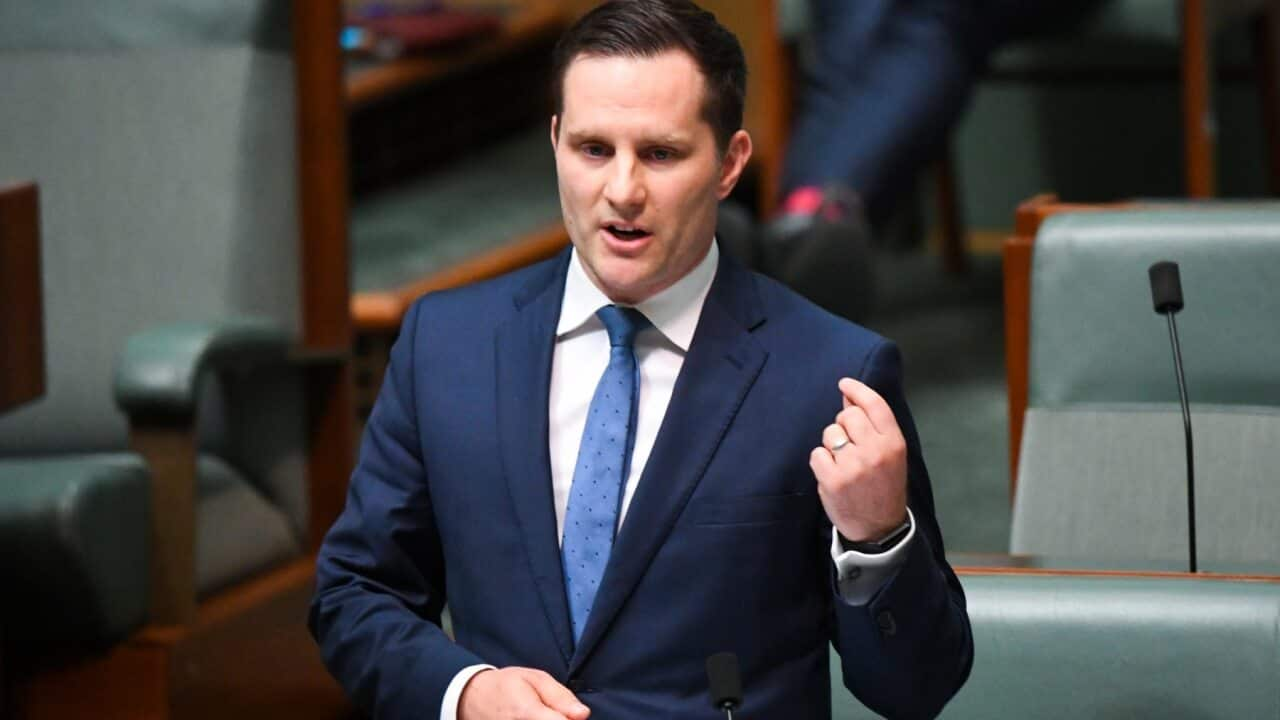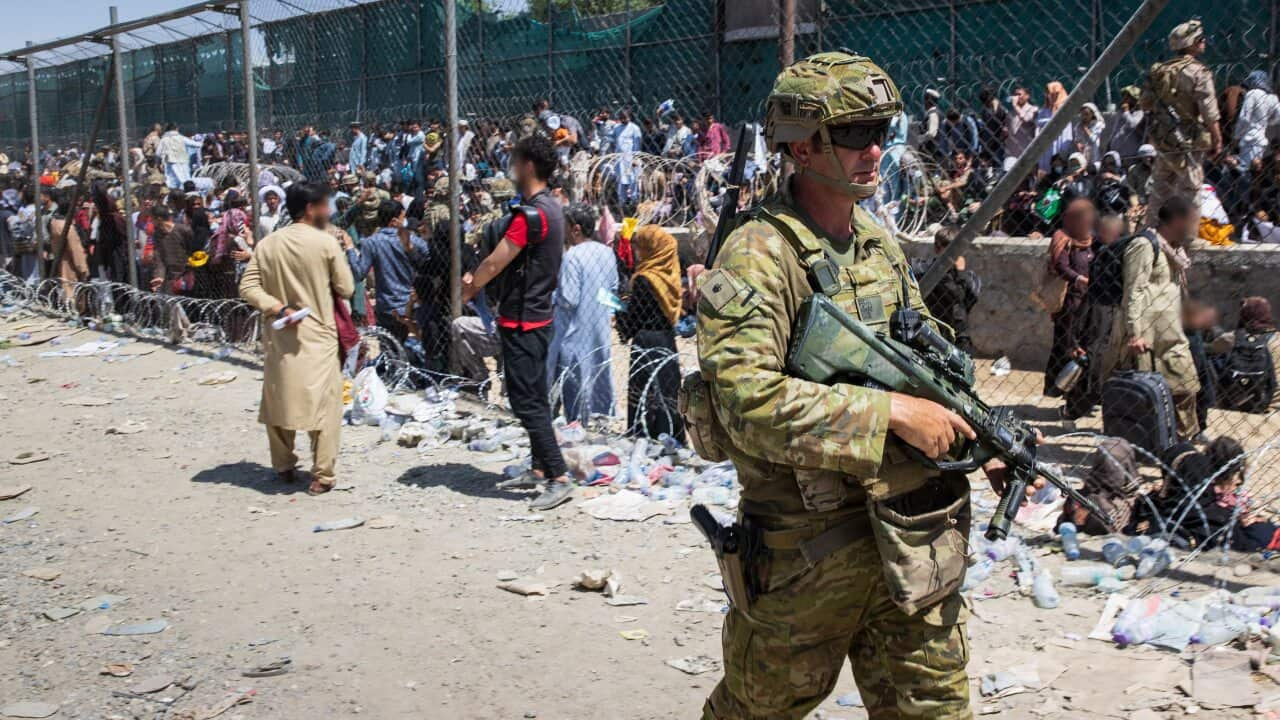The Australian government has announced it will provide at least 15,000 places for Afghan nationals through its humanitarian and family visa program over the next four years.
However, advocacy groups have labelled Friday's announcement "misleading", saying it is a commitment within existing quotas and not additional places.
In a statement, Immigration Minister Alex Hawke said this "increased allocation" includes 10,000 places for Afghan nationals within Australia’s existing humanitarian visa program and at least 5,000 visas within the family stream.
“The War in Afghanistan was Australia’s longest, and a humanitarian intake of this size reflects this. Our commitment to Afghan refugees will be second only in scale to our humanitarian intake from Syria and Iraq,” Mr Hawke said.
"The Government will continue to monitor processing numbers and reserves the right to increase the program in future years."
Mr Hawke said there has been an "unprecedented" number of visa applications from Afghanistan, with the Department of Home Affairs receiving more than 32,500 applications for the humanitarian program, on behalf of more than 145,000 individuals.
"In recognition of this demand, and in support of this specific visa commitment, dedicated teams within the Department of Home Affairs have been established to undertake priority processing,” Mr Hawke said.
The department will prioritise former Locally Engaged Employees and their immediate family members, subclass 449 holders and their immediate family members, those with enduring links to Australia and women and girls, ethnic minorities, LGBTIQ+ and other identified minority groups.

Hundreds of people run alongside a U.S. Air Force C-17 transport plane as it moves down a runway of the international airport, in Kabul, Afghanistan. Source: Verified UGC/AAP
The announcement follows the initial allocation of 3,000 places last August.
It came just hours after that laid bare the flaws in Australia’s withdrawal from Afghanistan, detailing how communication failures and shortsighted planning contributed to Afghans in need being left behind.
Among its eight recommendations, the report stated the government must continue to exert “all available effort” to finalising visa applications - in particular - for Afghans who served with Australian troops.
“There is no excuse for bureaucratic delays when lives are literally at stake,” the report said.
'Smoke and mirrors'
The announcement has been met with some criticism, with Sarah Dale, Principal Solicitor at the Refugee Advice and Casework Service (RACS), calling it "disingenuous" and "misleading" in that it doesn't create any additional places in the humanitarian program.
"What has been announced... is that this is a commitment within existing quotas. These are not additional places," she told SBS News.
"This is not with any urgency and therefore really does not go anywhere near addressing our 20 years of commitment to the people of Afghanistan. Nor does that address an escalating humanitarian crisis."
She called on the federal government to announce a further 20,000 places in Australia's humanitarian program in addition to existing quotas.
"Last year, we had approximately 5,000 grants in our humanitarian program of which 12 per cent of those places were already afforded to Afghanistan," she said.
"Without any additional increase, we are not acknowledging the increasing and escalating humanitarian crisis in Afghanistan."
Christian leaders, as part of the Christians United for Afghanistan campaign, are also urging Australians to "not be fooled" by the federal government's announcement.
Reverend Tim Costello, executive director of Micah Australia, said in 2017 Australia lifted its humanitarian intake in response to the conflicts in Syria and Iraq when it offered an additional 12,000 people safety, on top of the annual humanitarian intake.
"Prime Minister Scott Morrison is on the record saying there's no cap to the number of Afghan refugees Australia can take - but there is, and it's a paltry 15,000 over four years," Reverend Costello said.
“The Morrison government’s inadequate humanitarian response is a stain on our nation. This isn't a compassionate response, it's just more mean and tricky spin to disguise the Morrison's government's complete inaction."

Smoke billows near the Sardar Mohammad Daud Khan National Military Hospital after an explosion in central Kabul, Afghanistan, 2 November, 2021. Source: Reuters
The Action for Afghanistan Campaign, led by the Afghanistan-Australian Advocacy Network, said Mr Hawke's announcement made no mention of pathways to permanency for people in Australia or reviewing the policy prohibiting hundreds of people from Afghanistan in Indonesia.
“The announcement by Minister Hawke today does not begin to recognise our relationship with the war, our moral obligation to the people of Afghanistan, and the escalating humanitarian crisis in Afghanistan right now," said Arif Hussein, Human Rights Lawyer at Refugee Advice and Casework Service (RACS).
Barat Ali Batoor, a Hazara-Australian, photographer and organiser at the Asylum Seeker Resource Centre (ASRC), called the statement "insulting."
“Over recent months Afghanistan has seen women activists and vulnerable groups such as the Hazara are targeted by the Taliban and terrorised. Australia cannot sit by and do nothing following the longest war in the country’s history."
Shabnam Safa, Chair at the National Refugee-led Advisory and Advocacy Group, said it's time for Australia to put an end to "indefinite limbo for temporary protection visa holders and reunite families so people can get on with their lives.”
“The war in Afghanistan has been our longest international intervention and we are yet to see that commitment being honoured by the Australian government.
"....We have not seen any concrete action from the government yet. The situation in Afghanistan is only getting worse, not better."
Greens Senator Nick McKim also took issue with the announcement, describing it as "a pea and thimble trick that does not create a single new place in the humanitarian visa program."
“Australia has a moral responsibility to do far more than this given our culpability in the invasion and occupation of Afghanistan,” Senator McKim said in a statement.
“Of course more people from Afghanistan need protection, but this announcement means that for every person from Afghanistan who is granted a humanitarian visa, someone from elsewhere who desperately needs protection misses out.”
Senator McKim said the government has "drastically cut" Australia's humanitarian intake in recent years.
“Failing to create additional places for Afghan nationals simply adds insult to injury," Senator McKim said.
“The minister should also confirm that everyone from Afghanistan who was issued a 449 visa during and after the evacuation of Kabul will be granted permanent protection in Australia.”











